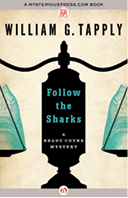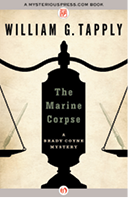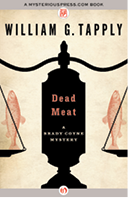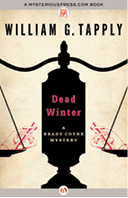Dutch Blue Error (28 page)
Authors: William G. Tapply

Later that evening we all met at Sam’s house. Sam kept pounding Eddie on the back telling him what a great game he pitched, and Eddie grinned shyly and didn’t say much of anything, and Jan hugged his arm. Josie kept running in and out of the kitchen where she had a vat of pasta bubbling.
“Tough one to lose,” I said to Eddie, when I found myself momentarily alone with him.
“Man, I was stylin’, when all of a sudden that Allen went ding-dong. Took me to the bridge.” Eddie took a big gulp from his Budweiser.
I smiled. “What did Kasko say when he came to take you out? He didn’t look too happy.”
“He said, ‘When I come out to get you, you wait for me. You wait right there on the mound ’til I get there. Don’t you ever make me look bad again.’”
“What’d you say?”
Eddie flashed his Huck Finn grin. “I told him not to sweat it, he wouldn’t have to get me any more.”
“And what’d he say to that?”
“He said if I was in Pawtucket it wouldn’t be a problem.”
Eddie didn’t go back to Pawtucket. He took his spot in the Red Sox pitching rotation, and when the season ended he had won six games, lost only that first one, and the Red Sox lost the pennant to Detroit by a single game. Even though he had played only half the season, Eddie got several votes for Rookie of the Year, which his teammate Fisk won. He had the city of Boston, as Sam liked to say, “by the short hairs.” Everywhere he went he was recognized, welcomed, loved. The Red Sox sent him to visit sick kids at Children’s Hospital. He did publicity for the Jimmy Fund. He spoke at Little League banquets and Rotary Club meetings in places like Andover and Bridgewater. I got him some easy endorsement money from a Somerville Pontiac dealer, and we signed a five-year exclusive contract with Rawlings, who wanted to manufacture a full line of Eddie Donagan sporting equipment.
Eddie started off the 1973 season about where he had left off—and it wasn’t until sometime in June when I first became aware of the change. It didn’t even seem important, because Eddie was still winning, and the sportswriters loved his ingenuous antics and inventive language. But he was starting to give up runs. The Sox had plenty of hitters, and they lived with the tradition of outslugging their opponents. In comfortable little Fenway Park, the Red Sox expected their pitchers to give up runs, so at first they didn’t seem to care that Eddie’s five-to-nothing games had become five-to-three or four. Kasko was making trips to the mound to bail Eddie out of ninth-inning trouble quite regularly, and a few times the relief pitchers failed and the runners Eddie had left on the bases scored, and then he was a loser.
I was with Eddie one night after he had blown a three-run lead in the eighth inning and was lifted from a game that the Sox eventually lost in the eleventh. Jan had gone to bed, and Sam and Josie were away, so it was just Eddie and I at the kitchen table sipping beer.
“You got a sore arm or something?” I asked him.
“Hey, you ever lose a court case?”
“Sure. Somebody’s got to lose. Sometimes I don’t have a case that can be won.”
“In baseball somebody’s got to lose, too.”
“Don’t give me that crap. Baseball’s different from the law. You’re not pitching the way you can.”
“This ain’t an easy game, lawmaster. Everybody gets beat sometimes. It ain’t like Fitchburg. No salad teams. These guys are all major leaguers. There’s no margin for error.”
I sipped my beer and said softly, “You seem to be erring a lot lately.”
“Christ, man, I ain’t a machine. So I’m making a few bad pitches. I’m still a winner.”
“You don’t look like a winner out there.”
He slammed his beer can onto the table. “Okay, man. Get offa my back, will you? You’re my lawyer, not my fuckin’ manager. You just take care of my iron and leave the baseball to us ballplayers. Okay?”
I shrugged. “Okay, Eddie.”
He cocked his head at me, his eyes blazing. I smiled and gave him the finger. Then he grinned. “Up yours, too,” he said. “Ah, shit. I’m sorry, man. I’m taking all kinds of horseshit these days, and it just don’t seem fair, know what I mean? What’s the matter with Eddie Donagan? I hear it everywhere. I see kids on the street, they yell, ‘Hey, Eddie, what the fuck’s the matter with ya?’ The papers they’re sayin’, ‘What happened to Donagan? How come he’s givin’ up runs and hits and even losin’ a game now and then?’ Now the coaches are startin’ to screw around with me, like I was some kind of little machine. They say, ‘Here, shorten your stride, you’re overstriding, Eddie.’ So I shorten my stride and it feels fucked up, and I tell them, and they say, ‘Look, kid, we’re big coaches, we’ve been around for a long time, and you’re just a young wise-ass, so you just do what we tell ya to do and we’ll make a pitcher but of you. Yessiree.’ Shit. I was a pitcher without them. They tryin’ to tell me I’m too—you know, eccentric. They tell me I gotta stop talkin’ to the players and fixin’ up the pitcher’s mound. They want me to try the, whatchacallit, you know, Bob Turley, the… ah, shit…”
“The no-windup delivery? They want you to do that?”
“Yeah, that’s it. Hey, that ain’t Eddie Donagan. One of ’em’s even sayin’ I oughta get another pitch. Wants to teach me the fuckin’ forkball. Hey, I don’t need no forkball, or a knuckleball or a palm ball or a goddam spitter. I just wish to hell they’d leave me alone, is what I wish.”
I lit a cigarette. “I’m sorry I mentioned it. You’re doing fine. Pitch a shutout for us sometime, though, will you?”
“Man, I feel one comin’ on,” he said. “Watch out, you Indians.”
But he didn’t pitch a shutout against Cleveland. He walked two batters leading off the seventh inning and Kasko yanked him. Eddie threw his glove into the dugout as he walked away from his manager. Later, Kasko told a reporter he was thinking of taking Eddie out of the starting rotation and putting him in the bullpen so he could, as he put it, “work out his problems.”
I was watching on television the night in Detroit that it all blew up in Eddie Donagan’s face. In the first inning he walked the leadoff batter on four pitches. The fourth actually went behind the batter, who glared at Eddie as he jogged to first. Eddie hit the next batter on the foot with his first pitch. His next pitch bounced in front of the plate and caromed past the catcher. The runners moved to second and third. That’s when Kasko came slowly out of the dugout. The television camera zoomed in on Eddie as he stood on the mound to wait for the manager to come take the ball from him. Eddie’s forefinger was pointed at his temple.
He called me collect later that night. “I’m all fucked up, man. I don’t know where the fuck it’s going. Oh, man, am I fucked up.”
“You been drinking, Eddie?”
“Damn straight I’ve been drinking, man. Oh, shit, I can’t do nothin’ any more.”
“It was just one of those things. You’ll be fine. Forget it.”
“Just one of those things,” he sang. “Yeah. Ha, ha. Forget it, he says. Listen, lawmaster, you ever try to talk and nothing but gobbledygook come out of your mouth? Huh? That ever happen to you, you gonna talk to the jury, be all eloquent and do your lawyer thing, and nothing but noises come out? You ever talk to a judge and hear yourself barkin’ like a dog? Huh?”
“Jesus, Eddie. It must be frustrating.”
“Frustrating! Ha! Know what they call it? Oh, big joke. It used to be a big joke. Something that happened to other guys. The Steve Blass disease. Remember Steve Blass? It means you’re a big league pitcher who wakes up one day and finds out that he doesn’t know where the fuck the ball is going to go when he lets go of it. Well, man, I got it. I got it bad. A bad case of Steve Blass. Terminal case. Eddie Donagan’s sick, and all the guys, they stay away from me now. They think it’s contagious. Don’t go near Eddie Donagan. He’s got the Big C. Cancer of the head. Even the coaches, they don’t look at me when they see me. All of a sudden they don’t wanna come near me. They think if they try to help me somebody’ll blame them for what happened. Ah, shit, man, am I ever fucked up.”
“How’s the arm? Is your arm okay?”
“Oh, man, the arm is beautiful. Still got the gas. I can throw the ball nine hundred miles an hour. I can still bend off a yakker that’ll come right back to me. Shit, after I came out of the game I snuck out to the bullpen. Know what? They could’ve propped the glove up on a stick and I would’ve hit the pocket every time. Shit. Perfect. I was fuckin’ perfect.”
“Well, then, it sounds like you’re fine. You’ll get over it. Just one of those things.”
“Naw. I was doin’ that before the game, too. Warming up I was great. Perfect. My head is messed up. Soon as the game starts I’m thinkin’ about my stride, and bending my back, and the hips and the shoulders and cocking the elbow and man it won’t go where I’m aimin’ it at all. I got bit by the Steve Blass bug and there ain’t no cure.”
His next start Eddie threw the first pitch over the middle of the plate, then nine consecutive balls not even close, and Kasko took him out. He didn’t pitch for eleven days. He worked out every day with the bullpen catcher. He threw the ball perfectly. When he next pitched he came into the sixth inning of a game the Red Sox were losing by five runs. He walked a batter and threw the next pitch shoulder high and out over the plate. It disappeared over the center field fence. For a major league pitcher, I knew, that home run pitch was just as wild as any of those that hadn’t been strikes.
Eddie spent the rest of the season back in Pawtucket. The Sox sent Stump Kelly down to work with him. They were even talking about trying a hypnotist. I talked to Eddie on the phone now and then. He said he was throwing the ball as well as ever—except in games. In games he had no control.
While Eddie was in Pawtucket Jan remained in Winchester with Sam and Josie. It was only an hour and a half drive from Pawtucket, but Eddie never made it. Jan said she understood. Eddie needed to work things out. Baseball was his profession. Right now, baseball came first. Eddie didn’t call her, either. Once in a while she phoned him. She told me Eddie was distant and even surly with her.
“He’s drinking a lot, I think,” she confided to me one day. “I think he’s got a real problem, Brady. He doesn’t want to see me. They won’t let him pitch. He just gets dressed every day and throws on the sidelines and takes a shower and goes to that room he’s living in and drinks. Will he get better, do you think?”
“I don’t honestly know. He’s got lots of people rooting for him. He’s young. His arm is still good.”
“But that’s not what I mean,” said Jan, snapping her head to toss her hair away from her face. “I mean, if he can’t pitch anymore will he get better?”
I touched her hand. “I don’t know.”
Buy
Follow the Sharks
now!
I wish to thank Rick Boyer and Betsy Rapoport again for their critical and spiritual support; my wife, Cindy, for her uncanny editorial eye as well as her tolerance; and my children, Michael, Melissa, and Sarah, for their patience and encouragement.
All rights reserved, including without limitation the right to reproduce this ebook or any portion thereof in any form or by any means, whether electronic or mechanical, now known or hereinafter invented, without the express written permission of the publisher.
This is a work of fiction. Names, characters, places, and incidents either are the product of the author’s imagination or are used fictitiously. Any resemblance to actual persons, living or dead, businesses, companies, events, or locales is entirely coincidental.
Copyright © 1984 by William G. Tapply
Cover design by Kathleen Lynch
978-1-4804-2745-7
This 2013 edition distributed by MysteriousPress.com/Open Road Integrated Media
345 Hudson Street
New York, NY 10014













